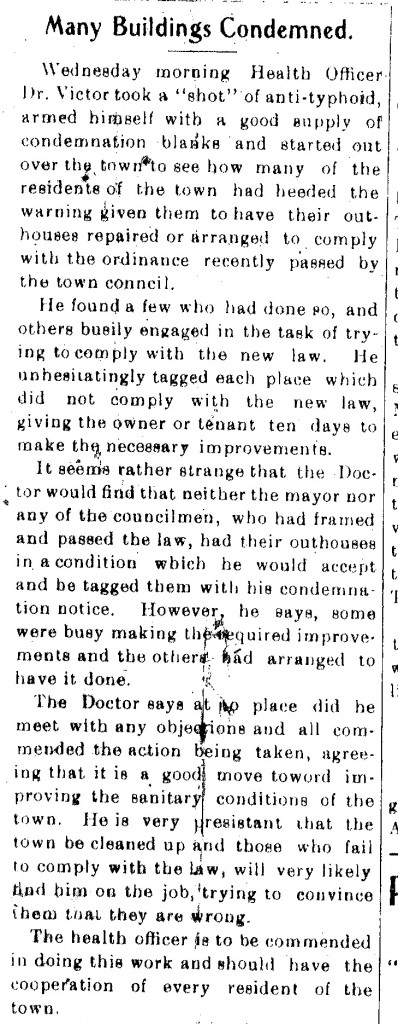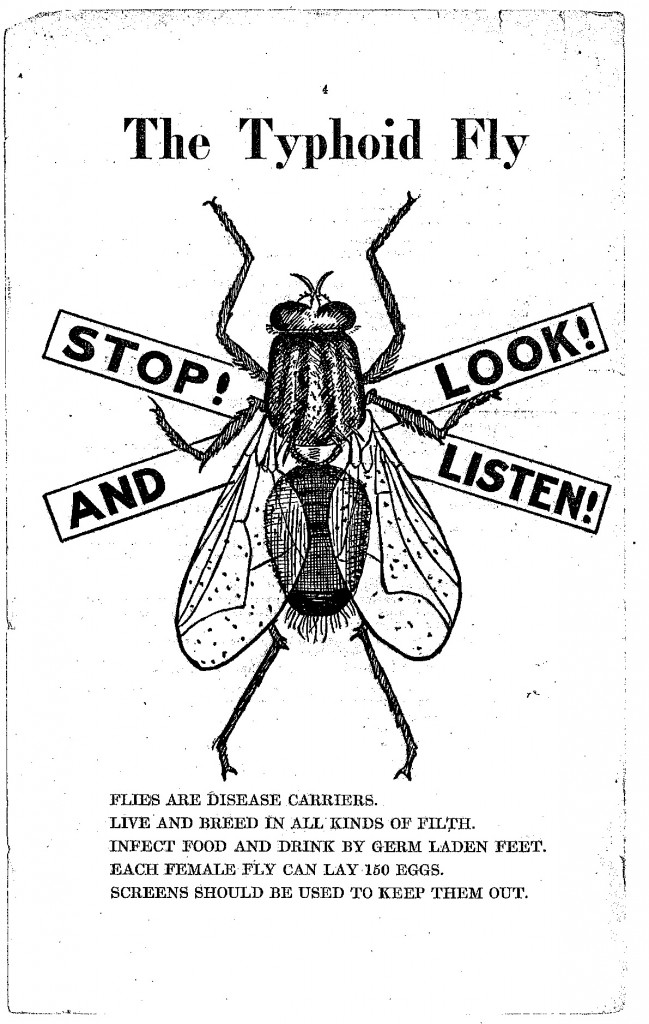Washtucna Stopping Typhoid at the Outhouse
From the desk of Steve Willis, Central Library Services Program Manager of the Washington State Library:
Typhoid was a very real killer in the United States a century ago. Although tremendous gains had been made in understanding and fighting the disease by the early 20th century, typhoid killed over 1400 Washingtonians between 1909-1915, including former Governor McGraw in 1910.
WSL has some interesting state publications from this time period addressing the problem. The primary source of typhoid, according to these books, were unsanitary outhouses. The use of springs on the doors and placing screens on any openings was promoted as a way to prevent flies from spreading the germs. The close proximity to any water supply was also recognized as a problem.
 This all came to my attention after I grabbed, at random, the reel for the Washtucna Enterprise, serving the small wheat farming town of Washtucna in the southeast corner of Adams County. This newspaper ran from 1902-1925. WSL has microfilm reels of the title from 1914-1924. The following article was found in the Sept. 3, 1915 issue.
This all came to my attention after I grabbed, at random, the reel for the Washtucna Enterprise, serving the small wheat farming town of Washtucna in the southeast corner of Adams County. This newspaper ran from 1902-1925. WSL has microfilm reels of the title from 1914-1924. The following article was found in the Sept. 3, 1915 issue.
Dr. Albert Victor (1869-1948), the hero of this story, has a nice biography, along with other members of his family, in History of Adams County, Washington. His efforts must have paid off. 1915 was the first year in quite some time the county reported zero deaths from typhoid.
Many Buildings Condemned.
“Wednesday morning Health Officer Dr. Victor took a ‘shot’ of anti-typhoid, armed himself with a good supply of condemnation blanks and started out over the town to see how many of the residents of the town had heeded the warning given them to have their outhouses repaired or arranged to comply with the ordinance recently passed by the town council.”
“He found a few who had done so, and others busily engaged in the task of trying to comply with the new law. He unhesitatingly tagged each place which did not comply with the new law, giving the owner or tenant ten days to make the necessary improvements.”
“It seems rather strange that the Doctor would find that neither the mayor nor any of the councilmen, who had framed and passed the law, had their outhouses in a condition which he would accept and he tagged them with his condemnation notice. However, he says, some were busy making the required improvements and the others had arranged to have it done.”
“The Doctor says at no place did he meet with any objections and all commended the action being taken, agreeing that it is a good move toward improving the sanitary conditions of the town. He is very persistant that the town be cleaned up and those who fail to comply with the law, will very likely find him on the job, trying to convince them that they are wrong.”
“The health officer is to be commended in doing this work and should have the cooperation of every resident of the town.”
There are a number of books celebrating the outhouse as part of the American experience in history. Typhoid is barely mentioned in these works, if at all.
Mostly these writings are humorously nostalgic, such as Andrew W. Berg in The Big Smoke, 1985: “I have often wondered if we are producing a nation of youngsters who are culturally disadvantaged because they have not experienced the thrill of pushing on outhouse over on Halloween.”
But for truly waxing eloquent, it is hard to beat this poem by my former neighbor Walt Tornquist of McCleary, Washington in his book, Sunshine and Shadows (1976). I would like to hear this recited by a gifted actor in the manner of the late John Houseman:
Old Privy
Have you grown up
Since modern plumbing came to stay?
If this is the case
You have missed the dear old privy days.
The privy in the old days
Was quite awkward at its best,
But the end product and satisfaction
Took care of all the rest.
A three-holer in the old days
Was a swanky exclusive retreat
And the old Sears Roebuck catalogue
Handled its part of the job real neat.
There was a large supply of drawbacks,
In the summer when the flies were thick
And in the winter when the ice and snow
Made the trail to the outhouse slick.
But this was pioneering,
And a trip when the wind blew hard and cold
Was a record breaking performance
Whether you were young, middle-aged or old.
I miss the dear old out house
Half hidden behind the old apple tree
Where old fashioned red and white roses
Were as fragrant as they could be.
But this is what they call progress
And sanitation thrown in to boot,
I still have a soft spot for the old privy,
I guess I’m sort of a coot!
